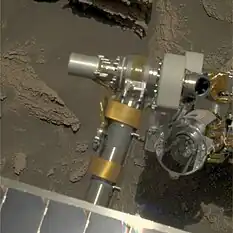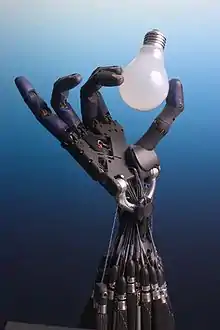| Honeybee Robotics | |
| Founded | January 1st, 1983 |
| Founders |
|
| Headquarters | , United States of America |
Number of locations | 3 Locations (3 Facilities) |
Area served | Worldwide |
Key people | Kiel Davis (CEO) |
| Revenue | $75,000,000 USD |
Number of employees | 284 (2023) |
| Parent | Blue Origin |
Honeybee Robotics is a subsidiary of Blue Origin that builds advanced spacecraft, robotic rovers,[1] and other technologies for the exploration of Mars[2][3] and other planetary bodies in deep space. The company, headquartered in Brooklyn, New York, has additional production facilities in Altadena, California and Longmont, Colorado.[4] The company has 284 employees[5] and creates exploration systems, infrastructure systems, and motion control software for the National Aeronautics and Space Administration (NASA), the Japanese Aerospace Exploration Agency (JAXA), Blue Origin, and other customers. On May 19th, 2023, Honeybee Robotics' parent company, Blue Origin, won a $3.4 Billion contract to build a moon lander and additional spacecraft for NASA's Artemis program.[6] The team, led by Blue Origin, is a partnership between Lockheed Martin, Draper, Boeing, Astrobotic, and Honeybee Robotics.[7]
History
Honeybee Robotics was founded in January 1983[8] by Steve Gorevan and Chris Chapman as a systems integrator using off-the-shelf robots. The company's first offices were above a piano shop on the Lower East Side of New York City. Their early work included robotic arms, robot end-effectors, and smart task-oriented electromechanical systems for companies including IBM, Allied Signal, The Salk Institute, Merck, 3M, and Con Edison. Honeybee Robotics received its first NASA contract in 1986 and continues to receive contracts to design and develop space systems.[9]
Honeybee Robotics was acquired by Ensign-Bickford Industries in 2017. In 2018, Avior Control Technologies was acquired by Ensign-Bickford Industries, which then merged Avior with Honeybee in 2019. Avior had been founded in 2010 by Scott Starin to design and manufacture motion-control components including custom motors, gearboxes, dampers, transducers, and actuators for the space, aerospace, and down-hole industries. In January 2022, Honeybee Robotics was sold to Blue Origin.[10]
In February 2023, the company shipped the Phobos Mining System to the Japanese Aerospace Exploration Agency (JAXA) and has also partnered with NASA and the Japanese Aerospace Exploration Agency (JAXA) to study the Martian moons, Phobos and Deimos.[11][12]
On May 19th, 2023, Honeybee Robotics' parent company, Blue Origin, won a $3.4 Billion contract to build a moon lander and additional spacecraft for NASA's Artemis program.[6] The team, led by Blue Origin, is a partnership between Lockheed Martin, Draper, Boeing, Astrobotic, and Honeybee Robotics.[13]
Products
Honeybee Robotics has particular expertise in developing and operating small mechanical tools used on Mars missions. Some of the company's robotic devices that have been used on Mars include:
- The Rock Abrasion Tool (RAT) instruments used on both Mars Exploration Rovers[14]
- The Icy Soil Acquisition Device (ISAD), sometimes called the "Phoenix Scoop",[15] a soil scoop and a precision ice-sampling tool successfully demonstrated on the 2008 Mars Phoenix Lander mission
- The Sample Manipulation System and Dust Removal Tool used on the Mars Science Laboratory mission, which landed in August 2012[16]

The company is now helping design instruments for NASA's VIPER rover.[17]
Honeybee Robotics develops systems for future planet missions that will explore our solar system including Mars,[18] Venus, the Moon, two Jovian moons,[18] an asteroid,[19] and a comet[20] among others. The company has partnered with Bigelow Aerospace to develop a preliminary design for a solar array deployment mechanism that was used on the solar arrays of Bigelow's Genesis inflatable space habitat. Terrestrial projects include developing mechanisms, installations, and systems for a broad array of clients including Con Edison, the U.S. Navy, Coca-Cola, Nike, and architects Diller Scofidio + Renfro.[21]
In December, 2022, NASA awarded Honeybee Robotics a contract to provide several systems for the upcoming Mars Sample Return mission. These include the Capture, Containment, and Retrieval System (CCRS), Earth Entry System (EES), and Spin Eject Mechanism (SEM).[22]
References
- ↑ "Honeybee Robotics wins NASA contract for Mars Sample Return System – Honeybee Robotics". Retrieved 2023-06-04.
- ↑ Adkins, Jamie (2022-11-22). "NASA Awards Contract for Mars Sample Return Systems". NASA. Retrieved 2023-06-04.
- ↑ LaBerge, Gene L. (1988). "Exploration drill cores in the Wisconsin magmatic terrane". Open-File Report. doi:10.3133/ofr88536. ISSN 2331-1258.
- ↑ "Locations". Honeybee Robotics. Retrieved 2 June 2016.
- ↑ "Honeybee Robotics Company Profile: Acquisition & Investors | PitchBook". pitchbook.com. Retrieved 2023-06-04.
- 1 2 O’Shea, Claire (2023-05-19). "NASA Selects Blue Origin as Second Artemis Lunar Lander Provider". NASA. Retrieved 2023-06-04.
- ↑ "SLD National Team". Blue Origin. Retrieved 2023-06-04.
- ↑ "Honeybee Robotics - Wiki". Golden. Retrieved 2023-06-04.
- ↑ "History – Honeybee Robotics". Retrieved 2023-04-09.
- ↑ "Honeybee Robotics to Join Blue Origin". 2022-01-25. Retrieved 2022-01-26.
- ↑ Dyne, Dylan Van; Zacny, Kris; Thomas, Lisa; Paulsen, Gale; Lam, Sherman; Williams, Hunter J.; Sabahi, Dara; Chu, Philip; Spring, Justin; Satou, Yasutaka; Kato, Hiroki; Sawada, Hirotaka; Usui, Tomohiro; Fujimoto, Masaki; Imada, Takane (2021-04-07). "Pneumatic Sampler (P-Sampler) for the Martian Moons Exploration (MMX)".
{{cite journal}}: Cite journal requires|journal=(help) - ↑ "Honeybee Robotics Ships Phobos Mining System to JAXA". Honeybee Robotics. Retrieved 2023-08-06.
- ↑ "SLD National Team". Blue Origin. Retrieved 2023-06-04.
- ↑ "Touch and Go Days - Astrobiology Magazine". astrobio.net. 7 February 2004. Retrieved 2 June 2016.
- ↑ "Sample Processing, Manipulation & Containment". honeybeerobotics.com. Archived from the original on 2 June 2008. Retrieved 2 June 2016.
- ↑ NASA.gov
 This article incorporates text from this source, which is in the public domain.
This article incorporates text from this source, which is in the public domain. - ↑ "Watch NASA Build Its First Robotic Moon Rover - NASA". 2023-11-03. Retrieved 2023-12-02.
- 1 2 K. Zacny, G. Paulsen, K. Davis, E. Mumm, and S. Gorevan, Honeybee Robotics Planetary Sample Acquisition, Transfer and Processing Technologies, presented at Mars Sample Return 2008, Lunar and Planetary Science Institute
- ↑ Derek Sears, Carl Allen, Dan Britt, Don Brownlee, Melissa Franzen, Leon Gefert, Stephen Gorovan, Carle Pieters, Jeffrey Preble, Dan Scheeres and Ed Scott, "The Hera mission: multiple near-earth asteroid sample return" Advances in Space Research, Volume 34 Issue 11, 2004, pp. 2270-2275 doi:10.1016/j.asr.2003.05.059
- ↑ S. Gorevan, I. Yachbes, P. Bartlett, K.Zacny, G. L. Paulsen, T. Kennedy, B. Basso, and J. Wilson, "Comet and Asteroid Sample Acquisition, Containerization, and Transfer for Sample Return" presented at Spacecraft Reconnaissance of Asteroid and Comet Interiors (2006)
- ↑ "Our mission". Honeybee Robotics. Archived from the original on 26 March 2006. Retrieved 2 June 2016.
- ↑ Adkins, Jamie (2022-11-22). "NASA Awards Contract for Mars Sample Return Systems". NASA. Retrieved 2022-12-11.
